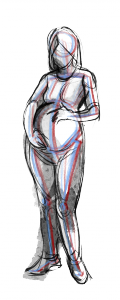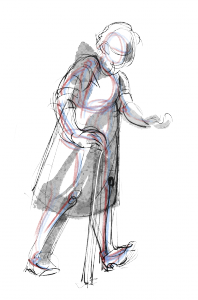SCOPE: The Health Humanities Learning Lab is the home of several exciting research, learning, and creative initiatives at UTSC involving undergraduate and graduate students, faculty, artists, and community organizations. Here are a few areas of current focus, with links to specific projects and/or outcomes.
 1. Arts, Humanities, and the Public Imagination of Health
1. Arts, Humanities, and the Public Imagination of Health
States of health and illness are often experienced outside of the professional health care setting. The arts and humanities have long served as a way to express—and explore—critical understandings of health and care relationships beyond the sanctioned spaces of the hospital or clinical encounter. SCOPE projects under this theme focus on how the arts and humanities reveal the profoundly public dimensions of health, illness, and disability: as complex cultural and civic phenomena that involve powerfully imaginative dimensions (such as stigma, fear, or magical thinking) alongside the biomedical facts of physiology. How have the arts and humanities been used to engage these issues? And how does the public imagination of health through the arts change across historical and cultural contexts?
Featured project: “The Art and Science of Immunization”, an international and interdisciplinary collaboration aimed at generating new thought and action on the major challenges facing immunization today, namely: the enhancement of communication about immunization and concrete, humanistically-inspired solutions to the urgent issue of vaccine hesitancy.
2. Health Humanities: Pedagogy, Values, Practice
The growth of Health Humanities as an interdisciplinary field presents exciting new avenues for research and teaching. SCOPE projects under this theme focus on building the Scholarship of Teaching and Learning (SoTL) research foundation of Health Humanities, with the aim of developing a robust, data-driven evidence base for the value of arts- and humanities- (i.e., liberal arts) methods and materials as an approach to undergraduate health education. What are the values that underpin Health Humanities at the undergraduate (i.e., baccalaureate) level, and how do these values align with–or differ from–the objectives of health professional training and practice? As the home of Canada’s first undergraduate Health Humanities curriculum, UTSC is ideally situated to promote undergraduate education scholarship part of this field’s larger paradigm of practice.
Ongoing projects include the development of Health Humanities-related teaching resources, a qualitative research study of student experiences in UTSC’s undergraduate Health Humanities curriculum, and undergraduate student-led pedagogical research projects. Click here for an open-access peer-reviewed article (co-written by UTSC faculty and undergraduate students), based on the teaching and learning experiences of UTSC Health Humanities students, published in Advances in Health Sciences Education (2020).
3. Age Studies Across the Life Course
 Growing old is not merely a physiological or biological phenomenon. The aging process also involves complex interactions with history, ideology, and the human imagination. SCOPE projects under this theme focus on aging across the life course, with particular focus on 1) the representation of older age in the arts, and 2) the role of creative engagement, arts-based therapies, and humanistically-informed research initiatives involving the aging process. What does a humanistic perspective add to our understanding of growing older, and how can these insights be implemented at the micro-, mezzo-, and macro-levels of personal conduct, health research and policy? How might the rigorously creative (re)imagination of aging, older age, and caregiving provide enhanced resources that enable us to challenge prevalent, and largely negative, personal and cultural narratives of growing older? Exciting year-round activities include aging-related film nights as part of UTSC’s Annual International Health Film Festival, as well as digital activism (as part of our affiliation with Concordia University’s Ageing+Communication+Technologies (ACT) Project).
Growing old is not merely a physiological or biological phenomenon. The aging process also involves complex interactions with history, ideology, and the human imagination. SCOPE projects under this theme focus on aging across the life course, with particular focus on 1) the representation of older age in the arts, and 2) the role of creative engagement, arts-based therapies, and humanistically-informed research initiatives involving the aging process. What does a humanistic perspective add to our understanding of growing older, and how can these insights be implemented at the micro-, mezzo-, and macro-levels of personal conduct, health research and policy? How might the rigorously creative (re)imagination of aging, older age, and caregiving provide enhanced resources that enable us to challenge prevalent, and largely negative, personal and cultural narratives of growing older? Exciting year-round activities include aging-related film nights as part of UTSC’s Annual International Health Film Festival, as well as digital activism (as part of our affiliation with Concordia University’s Ageing+Communication+Technologies (ACT) Project).
Featured Project: In 2016 UTSC was the site of ACTipedia: Resisting Digital Ageism, a collaborative action research project that aims to counterbalance the relative invisibility and lack of content on Wikipedia about current critical ageing studies. Click here for a Storify generated by our anti-ageism Day of Action in Winter 2016, and here for a magazine article on this example of academic activism in the exciting field of age studies.
Stay tuned for the kick-off of SCOPE’s Resemblage Project, an intergenerational digital art and research-creation initiative. Coming soon!
